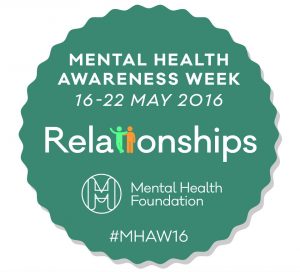
Did you know that one in four of us will experience a mental health issue in any given year? Or that stress, anxiety and other mental health issues are the main reason for long-term absence in the Civil Service?
Whether as an individual, a spouse, a parent or as a manager, you’re far more likely than not to come across mental health issues. Yet mental health is still far harder to talk about than physical health issues.
I know myself just how hard this is. When I was 39, I was taken seriously ill. The diagnosis of a persistent cough revealed a tumour the size of an orange in my chest. Thankfully, it was benign, and after some major surgery, and a month off work, I started recovering.
What I hadn’t expected or anticipated was the fog of depression that descended on me after surgery. For six months, I found it almost impossible to get out of bed and go to work. I put on a brave face in the office, feeling fake, and very alone, then slumped back into bed at the end of each day, often in tears.
Stigma
I had found it relatively easy to open up to work colleagues about the surgery, and to ask them and my boss for help in coming back to work gently afterwards. In contrast, I told no-one about the depression and just tried to keep going. It was only when I plucked up courage to visit a GP – who was lovely – that I started to handle it. A year or so later, when I tentatively mentioned it in conversation to very close friends, I found that most, not just a few, had been through something similar at some time in their lives. But most had also never talked about it, and had felt very alone.
 The stigma of mental health won’t go away unless we talk about it and support each other. This year, Mental Health Awareness Week runs from 16 May. Throughout the week, I hope you will join me by getting involved to raise awareness of mental health.
The stigma of mental health won’t go away unless we talk about it and support each other. This year, Mental Health Awareness Week runs from 16 May. Throughout the week, I hope you will join me by getting involved to raise awareness of mental health.
Relationships
This year’s theme is all about relationships. Healthy and supportive relationships reduce the risk of mental ill health and promote positive well-being. We all have relationships that span all aspects of life, through family, friends and work.
In the workplace, it is really important that individuals and managers are able to talk openly about mental health. These relationships play a crucial role in supporting individuals facing difficulties. Grabbing a five-minute coffee with a stressed employee, asking them how they are, listening, and seeing if there is anything you can do to support them, may help to prevent problems escalating later on, as well as stopping them feeling isolated. It certainly would have helped me to be able to talk about what was happening.
It is very important that we all know more about mental health and reflect on the importance of relationships. I hope you’ll take some time during this week to talk to your colleagues and encourage open conversations.
Walk and talk
As Health and Well-being Champion, I am delighted by the variety of events taking place to raise awareness of mental health across the Civil Service. For example, FCO are hosting Walk and Talk events, encouraging staff to leave their desks at lunchtime and take a walk and talk to different colleagues. This year’s Civil Service Live will also feature ‘Talking about Mental Health’ sessions. These will offer an opportunity to hear from senior colleagues who will be sharing their personal experiences.
Together, we can take action to support each other, raise awareness, encourage conversations and make it routine to talk about mental health – and support each other through situations which are, in all walks of life, far more common than most of us realise.

5 comments
Comment by Dave Brown posted on
I agree that it was very brave to openly talk about your situation. I have suffered with depression and work related stress but only recently come to terms with this as an individual.I think that admitting you are suffering to yourself is one of the biggest hurdles to overcome. I hadn't realised, until speaking with a specialist, that one of the biggest causes of depression is suffering chronic pain. I have lived with this for years but always hidden my inner-self.
Comment by Gavin Thomas posted on
Natalie, Thank you for being so honest in your blog and for talking about your lived in experience. In my particular case, if I had not made contact with the Employment Assistance Programme and if they had not rang me within a very short space of time, I am not sure I would be here today drafting out this response to you! As a Member of the FCO Wellbeing Network [WBN], I want to say thank you for making mention of the way in which we [FCO] are seeking to promote Mental Health Awareness Week here in London, in Northgate House, in Hanslope Park and at a number of our Overseas Locations. Today [19th May] our PUS Sir Simon McDonald has kindly offered to lead our lunchtime walk through St James Park. We are meeting at the Clive Steps on or around 11:30. We already have several colleagues from the Home Office who have asked to join us. We would welcome anyone else who would fancy some fresh air and the chance to meet their Whitehall Colleagues. Whilst the WBN is an FCO Staff Association, we also work closely with our other colleagues including the Home Office MH Buddy Group based in Marsham Street. Anyway, I really do hope that everyone makes the effort to take a break from their desk and either have that talk with a colleague, learn a new skill or take a stroll. Gavin Thomas
Comment by Helen Galloway posted on
I think the bullying and stigma is still a huge issue. If someone has mental health issues and a manager does not support them, treats them differently to other staff, refuses to acknowledge it (which I have seen happen) then it should be a disciplinary matter supported by the disability discrimination act. Like discrimination due to age, colour, belief e.t.c is. But managers need additional support to manage and do this. Having said that I have had some managers who really try to help so that's very positive. And we can't expect mangers to be miracle workers either and be a Doctor :O). Just supporting helps. Making people more aware of it, not hiding it, ridiculing or dismissing it making it ok to talk about though will really help. I think most people are just unaware of how little things can trigger off pain with someone who has mental health problems. Sometimes they think they should just snap out of it, I cope so why cant they, they are just trying it on. I'm not sure how to deal with this issue as it is a complex one and I've seen people with mental health problems that I feel don't help themselves at all when they probably could. So there are two sides to the spectrum. With needing resilience being part of what we need to do our job in these very tight times I think its sometimes unrealistic to think that people with mental health issues can always be resilient. Hope this makes some kind of sense :O). We are moving in the right direction though which is really good.
Comment by Iris Anderson posted on
Need to acknowledge the work of networks that support colleagues suffering from mental health issues arising from bullying,harassment and discrimination (BH & D). Can the Champion help find realistic solutions to tackle these areas. Going to a full blown grievance procedure is not the answer to dealing with BH&D. We need to move from talking to real action.
Comment by Charlotte Smith posted on
Very brave of you to open up about your experience of depression. I am no stranger to this disease/illness having suffered from it myself. What we do need to do in the workplace is to tackle the root causes of depression in the workplace. There is still bullying going on for example which needs to be tackled.
On a brighter note, perhaps some money could be ring fenced to brighten up the offices. For example look at bringing in some office friendly trees and plants. And what about a fish tank in the foyer, perhaps behind the security desk so that when people come into work they can admire the aquaruim. Or inspirational posters, but with a twist, have a Star Trek one, or Game of Thrones one or even a Sherlock Holmes one. It can be made relevant to work. For example Jon Snow as an inspirational leader. Sherlock Holmes looking for clues to acheive best practices, And Mr Spock with a quote on how logical it is to work together as a team. That sort of thing. It would add atmosphere and a bit of fun whilst underlining a serious point.
Hope this helps 🙂